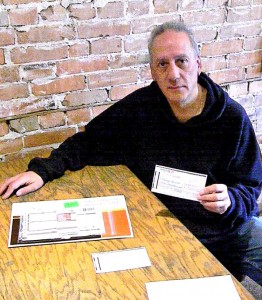
You’ve probably heard the old saying, “If it sounds too good to be true, it probably is.” Lorenzo Semeraro of Stevensville thought he was on a pretty good track to be pulling in some much needed extra income when he answered an advertisement for a job that would require working only one hour a day for three days a week, at a wage of $50 per hour.
In March he answered an advertisement to work as a tutor for a twelve-year-old boy from England but got no reply. However, at the end of August he received an e-mail from someone calling themselves Andrew Paul who claimed to be relocating to Montana from England. He said he was looking for someone to tutor his 12-year-old son, Nelson, in English, math, reading and science. The e-mail stated that the boy would be arriving with a nanny as he would have to remain in England for work purposes for a short while.
Paul stated in the e-mail that he would be sending the payment for the tutorials, “while I also pay the Nanny that will look after him.” The e-mail continued, “So as soon as you get the money/funds cleared you’ll deduct cost of tuition for the month and send balance to the nanny that would be looking after my son in the state.”
Semeraro responded, expressing an interest and stating that the monthly charges for the tutorial would be $600. He received a reply stating that the funds should be received soon in the form of a cashier’s check or money order and that Semeraro was to cash the check, take his cut and send the rest to the nanny.
The nanny was referred to as “she” but the name of the person that the extra funds were to be sent to was Fred Bucci. When Semeraro tried to verify Bucci’s address it turned out to be a convenience store where the employee who answered the phone said he had never heard of a Mr. Bucci. Another address was sent but that turned out to be another person’s address once Semeraro looked into it.
Finally Semeraro received two money orders in the mail. Rather than cash them and forward the funds he took them to the Stevensville Police Department. The money orders turned out to be fakes. Semeraro was told that if he had actually taken them to the bank they most likely would have been cashed by the bank and the fraud only detected later. In that case, if Semeraro had cashed them and forwarded the funds, he would have been on the line for the criminal transaction.
Because the money orders were actually mailed from Canada, the police told Semeraro that it would be almost impossible to follow up on the issue without filing charges in Canada. He said to add to the difficulty the fraud was probably being perpetrated from off shore compounding the difficulties in pursuing the investigation.
Semeraro said that he came to the newspaper to tell his story so that other people could be made aware of the scam.
Sue Doctor says
A scam like this is too easy to pull and there’s really nothing that can be done about it except educating people, especially teaching them to be skeptical of any offer that’s too good to be true. I’m glad this gentleman asked the newspaper to get this story out.